Summer Research Opportunities
Are you interested in how people tell the stories of their community?
Or in how the pandemic might have affected the way people speak?
Do you want to gain some research experience?
Apply to join us in summer 2023 at Michigan State Sociolinguistics Lab!
All applications are due Friday, February 24, 2023 by 5pm EST
NSF Research Experience for Undergraduates (REU)
- Location: The Sociolinguistics Lab at Michigan State University‘s East Lansing, MI campus.
- Eligibility: US citizens registered as undergraduate students in Summer 2023 (depending on the institution, this may include incoming freshmen).
- Duration: 8 weeks in the summer (June 5 – July 28, 2023).
- Pay: $600 per week for 30 hours work per week.
- Background: Students do not need prior linguistics experience to apply!
We hosted an informal webinar via Zoom on Wednesday, January 18 to introduce the professors, the graduate student mentors, and explain more about what the summer research experience will be like! Click here to watch a recording of the webinar.
Students joining us through the MSU Summer Research Opportunities Program will also receive room, board, and travel expenses.
MI Diaries has lots of opportunities for you to get involved over the summer too! Undergrads can join the project as volunteers, or as hourly RAs when we have paid positions available. Check out our Join Us page to learn more!
What summer research students do
- Meet weekly with your graduate student mentor and faculty advisor.
- Attend main project meetings each week.
- Listen to diary entries, and help select which stories get featured each week.
- Learn and do the basics of sociolinguistic analysis: transcription, coding, how to develop a good research question, and analysis.
- Recruit new participants to the project.
- Meet weekly with your graduate student.
- Help run an MI Diaries’ session at MSU Grandparents University, where we introduce kids and their grandparents to the secrets behind asking great sociolinguistic questions.
- Identify and participate in other outreach ideas across Michigan.
- (Optional): conduct a small original research project with MI Diaries data (with the support of your mentor and faculty advisor), to be presented at MSU’s MID-SURE conference.
- Be a part of our intellectual community: Listen to practice talks and hear about cutting-edge research being done by sociolinguists at MSU!
- You’ll be eligible to attend many professional development workshops offered by the MSU SROP program — even if you’re not a SROP student!
- We only require 30 hours of work per week, leaving you plenty of time to relax and explore the East Lansing area.
- We’ll also offer some fun activities that might include bowling, ice cream at the MSU Dairy Store, and a Lansing Lugnuts baseball game.
How to Apply
Students applying via the MSU Summer Research Opportunities Program should follow the instructions on the SROP application page.
To apply, please see the instructions below. All applications are due Friday, February 24, 2023 by 5pm EST. Email items 1-4 directly to our project email address (MI.Diaries@msu.edu).
- Statement of purpose (1 page, single-spaced, 12pt font)
- This essay should state your short-term and long-term professional goals, and explain why you are applying for this opportunity. You should discuss how the experiences afforded by the REU program aligns with your goals and how your academic background has prepared you to benefit from the program. You should explicitly state your interest in and experience with any or all of the following subfields in linguistics: sociolinguistics, cultural linguistics, language acquisition, language documentation and revitalization, psycholinguistics, etc. You are encouraged to visit the MSU Linguistics website (https://lilac.msu.edu/linguistics/) to get an idea of the research currently being done by faculty and graduate students in the department.
- Personal Statement (1 page, single-spaced, 12pt font)
- This is your chance to tell the committee about yourself as a person in ways that may not be visible in your other materials: any challenges you’ve overcome in getting to or getting through college, any achievements or accomplishments you’re especially proud of, anything in your personal background that prepares you for this opportunity. This statement and the statement of purpose are equally important.
- University Transcript
- An unofficial transcript is sufficient.
- Resume/Curriculum Vitae (submit either one, not both)
- Resume: This is a document of no more than two pages summarizing your education, work, research, and/or volunteer experience relevant to the program.
- CV: This is an extensive summary of your cumulative experiences. The CV should provide a more detailed account of your education, work, research, and/or volunteer experience, including any publications, public presentations, and/or other academic accomplishments. It may be as long as you wish.
- Two Faculty letters of Recommendation
- You should request letters from any two college-level faculty members who can speak to your academic and research potential, as well as the character traits that facilitate your ability to succeed in a new environment. If you are a rising Freshman (just finished high school), you may ask for letters from high school mentors instead. All letters should be sent directly from the recommenders to MI.Diaries@msu.edu and should be addressed to Professor Betsy Sneller and Professor Suzanne Wagner, Department of Linguistics, Languages, & Cultures, Michigan State University.
Meet the REU Mentors
Faculty Advisors

Dr. Sneller is an Assistant Professor of Linguistics at Michigan State, and the head of the MI Diaries project.
Overall, her research looks at how language is impacted by social factors (like a whole city changing its pronunciation over time), and how speakers use language to show their identity (like how certain pronunciations get interpreted as sounding “tough”). You can check out some of her work on her personal website.
Her favorite ice cream flavor is Moose Tracks, and is always interested in trying new kinds of food. Even though she doesn’t know anything about baseball, she loves the Lansing Lugnuts.
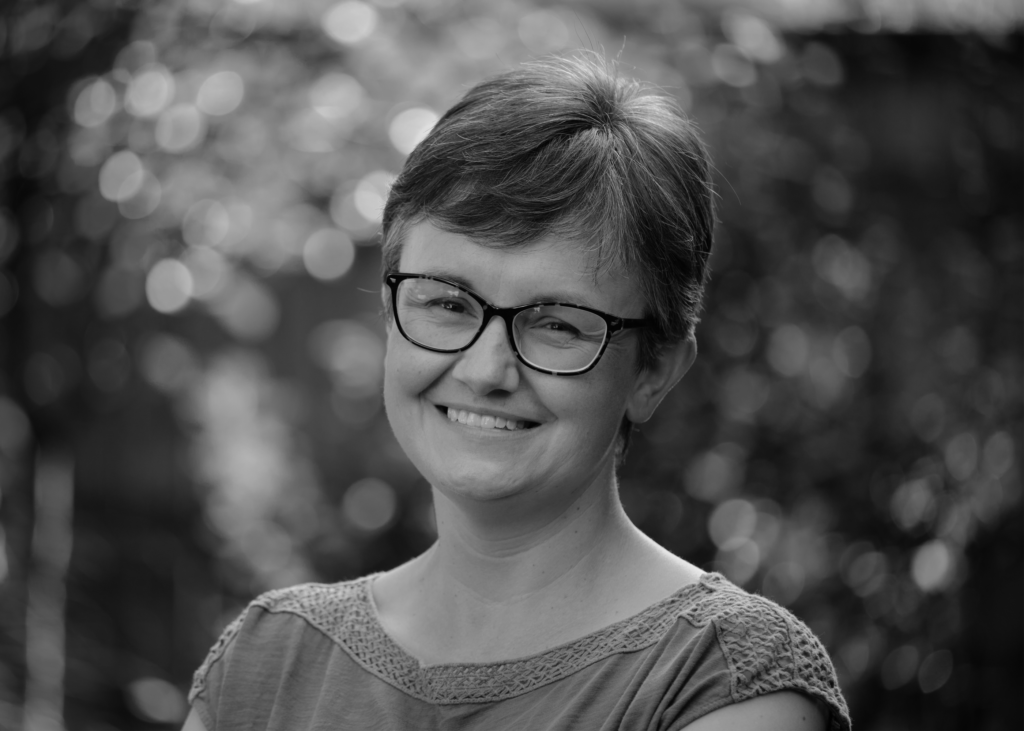
Dr. Wagner is an Associate Professor of Linguistics at Michigan State, and the co-lead of the MI Diaries project.
Her research looks at how social meaning gets attached to linguistic variation, with the goal of understanding what motivates language change. She’s especially interested in the extent to which individual speakers do or do not participate in ongoing changes in their communities. You can check out some of her work on her personal website.
Suzanne likes long walks in the woods with her family, reading memoirs, and exploring new cities. Her favorite comfort food is Marmite on toast.
Graduate Student Advisors (2023)

Yongqing Ye is a 3rd year Ph.D student in Linguistics at Michigan State.
Her research interests are in phonetics, language variation, and sociolinguistics. In other words, she works with sounds, and how language varies with social factors! In a recent project, Yongqing investigated whether listeners perceive words (like “ban”) differently from non-words (like “shan”).
In her spare time, Yongqing enjoys hiking, journaling, and going to medieval festivals.
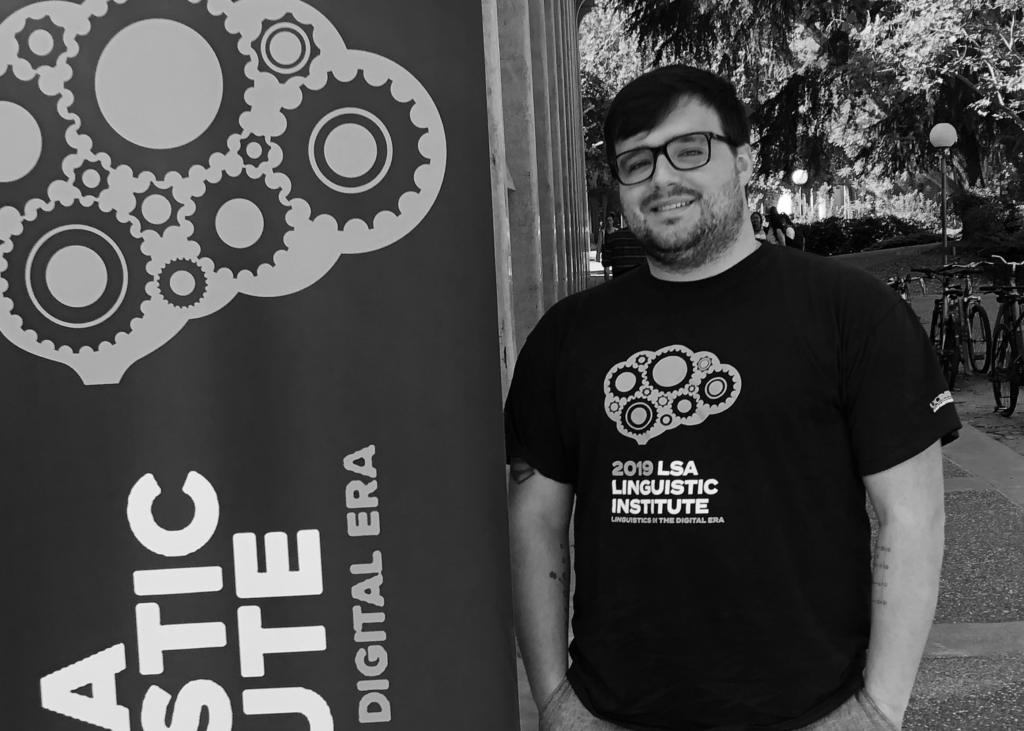
Adam Barnhardt is a 1st year Ph.D student in Linguistics at Michigan State.
His research interests are in sociolinguistics and sociophonetics. His MA thesis investigated how listeners interpret social information (like whether they think the speaker went to college), based on how speakers pronounced words. Adam’s current research project investigates how speakers might change their pronunciation when they are trying to present different aspects of their identity.

Jack Rechsteiner is a 2nd year MA student in Linguistics at Michigan State.
Their research focuses primarily on sociophonetic variation in nonbinary speakers. They are broadly interested in how personal identity is expressed through and formed by language usage.
Jack grew up in the area around Saginaw, MI. In their spare time, Jack likes to play guitar, go for hikes, solve puzzles, and spend time with their pets.
Examples of REU Student Research
Previous REU Student Researchers
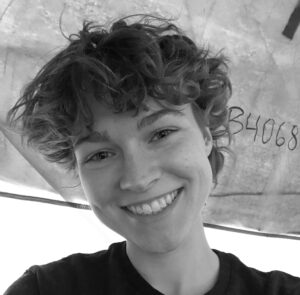
Jayce Garner’s research involved conducting a quantitative case study of one MI Diaries participant’s use of (ING) to determine if the participant’s speech became less formal as they became more familiar with the project.
Jayce established the participant’s baseline use of (ING) in their first five diaries, and compared this baseline to the participant’s use of (ING) after one year of submitting diaries and after two years of submitting diaries.
You can watch a video presentation of this research here.

Hailey Deptula’s research looked into the lexical variation exhibited in the speech of Michiganders living in different parts of the state when specifically referring to a student’s graduation celebration.
Hailey’s research used MI Diaries responses to examine how the pair open house/graduation party pattern geographically across Michigan speakers.
You can watch a video presentation of this research here.
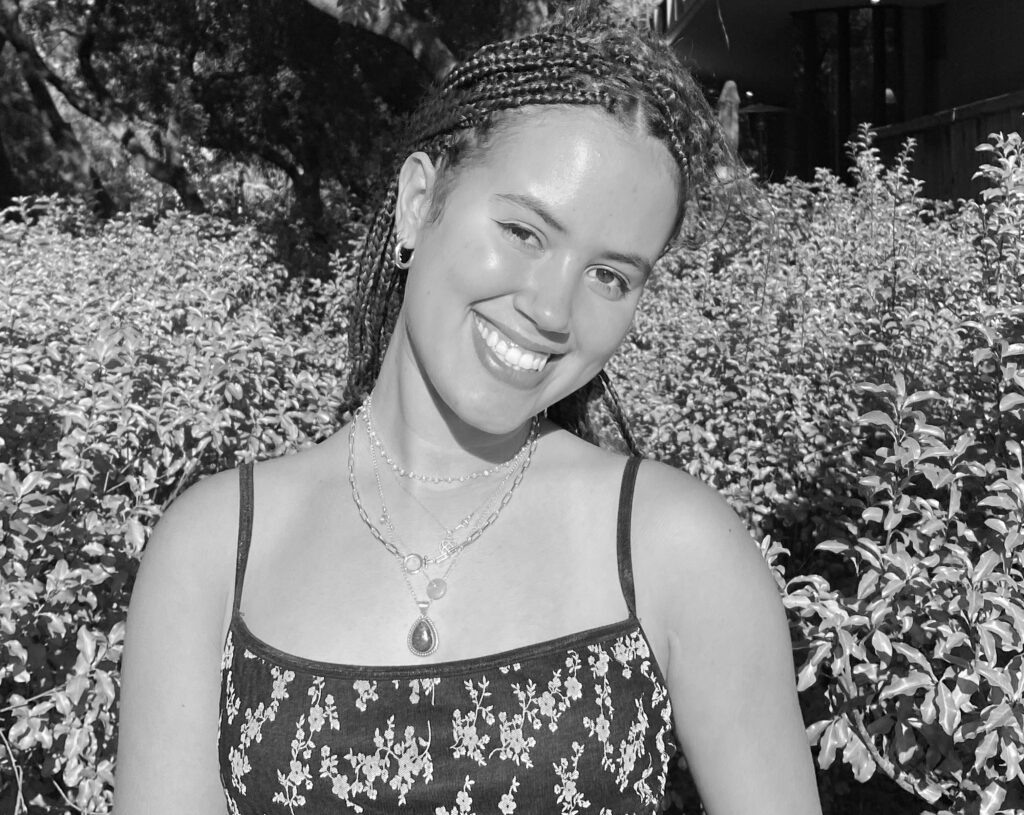
Olivia Jessner’s research involved a qualitative analysis of the distribution of sign-offs in MI Diaries recordings to investigate if the presence of a sign off is affected by gender.
Olivia reviewed 50 diaries, 25 from self-identified women and 25 from self-identified men, to determine which diaries ended with a sign off.
You can watch a video presentation of this research here.
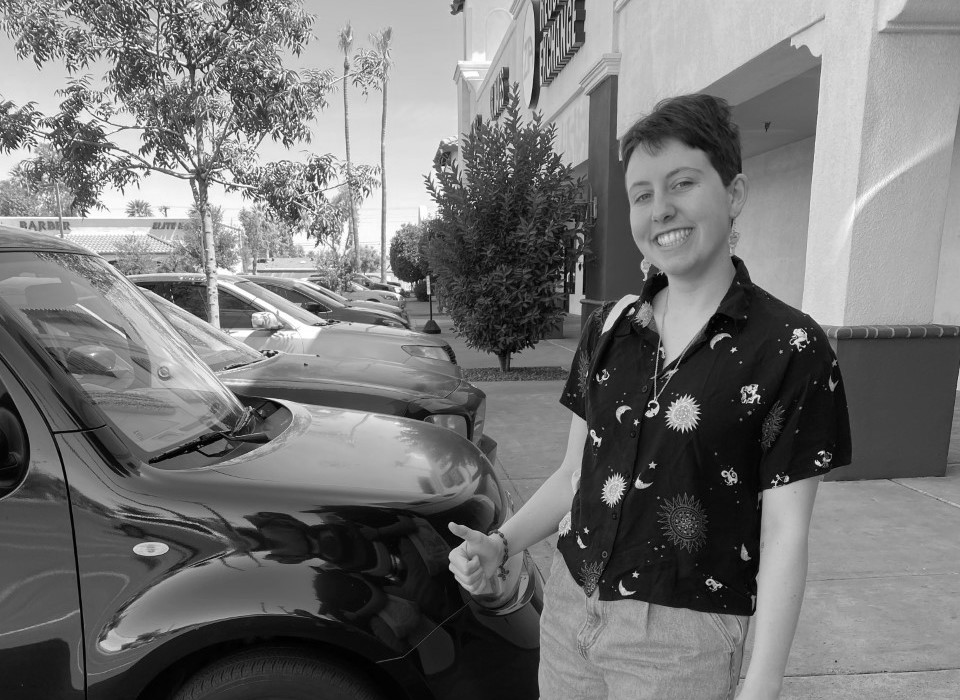
Olivia Marquardt’s research looked at the rates which Michigan speakers are adopting the the caught-cot merger, which is a feature of the the low-back-merger.
Olivia used data from audio diaries submitted to MI Diaries that responded to the question “Do you pronounce the words caught and cot differently?” and measured the usage of the vowels in caught and cot when the vowel is in the primary stress position of a word.
You can watch a video presentation of this research here.
Informational Webinar Recording
Summer REU FAQs
In summer 2023, REU students will join us in-person. Although most of the research in MI Diaries is done remotely (via Microsoft Teams), summer students will get the best experience from living on or near campus, spending time with us in the Sociolinguistics Lab, and helping us with outreach events such as Grandparents University.
In our first summer (2022), most of our REU students were remote. At that time, MSU’s campus was still largely shut down. Now that campus is fully open and thriving again, there is so much to enjoy here!
Students joining us via the MSU SROP program will automatically receive lodging and meals on campus, plus the cost of travel to East Lansing.
If you’re not joining us as a SROP student, you will pay for travel, food, and lodging yourself. Remember: You’ll receive $600 per week! The MI Diaries team can book a room on campus for you if you’d like to live in a dorm. In summer 2022, the weekly cost for a room in Owen Hall (no meals) was $224.
We recommend that you book accommodation from Thursday June 1 or Friday June 2 to Monday July 31 to allow for time to settle in and time to transition out.
- Students must be a U.S. citizen or permanent resident
- Students must be enrolled as an undergraduate
The REU summer experience begins on June 5th, which may overlap with the end of the term for some students (especially those on the quarter system). This can still work! If you are still finishing up with your school term when the REU program starts, we will work with you to make an adapted schedule for the beginning of your REU experience, so that you can finish up your term and still be a part of the REU summer experience.
Rising freshmen are eligible, but you must be enrolled by the time summer starts. You can email MI.Diaries@msu.edu to ask more.
Unfortunately, you are not eligible to apply for the Summer REU position. However, you can always join us as a volunteer!
The short answer is no. We are looking for letters from supervisors who can speak to qualities that would make you a great candidate for this position.
- It’s best if at least one of your recommenders is a professor (or high school teacher), who can speak to your academic background, intellectual curiosity, and/or experience and abilities to do analysis. If you’ve taken a Linguistics course, it’s even better to ask your Linguistics professor. If you’ve never taken a Linguistics course, any mentor or professor is another great person to ask.
- But we are also looking for team members who are reliable, self-motivated, detail-oriented, problem solvers, and who can bring creative ideas to the table. Anyone who has supervised some work (it doesn’t need to be academic work) of yours who can speak to these abilities is a great person to ask! This could be a supervisor, a coach, a boss, etc.
The most important thing is to be clear in your writing. You don’t need to be super formal and rigid, but you do need to demonstrate that you’re serious and that you know how to summarize your interests and experience. Sometimes simple writing is the best writing!
Yes! It’s a bonus to us if you come with different life experience. If you took a gap year and worked at a coffee shop, that’s actually very helpful for us. If you spent some years as a mechanic, that’s awesome. If you worked at your local ice cream shop, that’s helpful to us. All the life experience that you have brings different perspectives to the project, and it helps us to know what variety of things you’ve experienced.
We have funding for 2 students per year. However, we’re occasionally able to find additional pockets of funding. We also welcome applications from people who are applying for opportunities, such as grants or awards, from their own university. In 2022, this allowed us to offer 4 spots.
Yes! We want to give REU students a full experience. This includes putting some work in on each of our “sub teams” each week. Estimated time per week is given – but this will fluctuate from week to week, as needs arise!
- Main project meeting: coming up with prompts, overall MI Diaries goals and progress (1 hour per week)
- Story selection team: listen through diary entries as they come in, help pick the 3-6 stories that we’ll feature on our website (2-4 hours per week)
- Analysis team: hand correct automated transcripts and prepare diaries for acoustic analysis (5-8 hours per week)
- Community team: come up with ideas for community outreach and participant recruitment, help make those ideas happen! (3-6 hours per week)
- Brand team: help design some of the projects that help the Community Team recruit; manage our social media accounts, help make sure our website is up to date (4-7 hours per week)
- Project maintenance: learn a little bit about project management through helping our Project Manager (Caroline) with some project maintenance tasks (2-3 hours per week)
- Individual research (optional): work with faculty & grad student mentors to come up with a small research question, obtain and analyze the data, and report your answers back to the team (2-5 hours per week)
- Professional development: GRE prep, CV prep, etc – in connection with MSU’s SROP program (1-3 hours per week)
Yes. Students who worked with us remotely said that working online made it harder to form a cohort with the other REU students and harder to find motivation to work asynchronously. This year we would like participants to come to campus, unless you have a specific reason for needing to work remotely.
You can read more about the MI Diaries project’s mission, vision, and values on our About the Project page and you can see some of the research we have done so far on our Research & Publications page.
This is something that we are very interested in as a project. Most of our diary entries are in English, but it’s not a requirement of the project. Participants can choose to participate in any language they feel most comfortable in. If multilingualism and multiculturalism are an interest of yours, please let us know that in your application materials. These are topics we are definitely interested in expanding our research on!
If you’re applying through MSU’s Summer Research Opportunities program (SROP) and you have questions about SROP’s accommodation, activities, or application process, please contact the SROP team.
For all other questions, no matter how you’re applying, email MI.Diaries@msu.edu. We’ll make sure that your question is brought to the attention of Drs. Sneller and Wagner.
